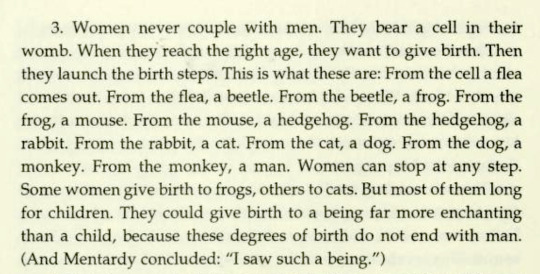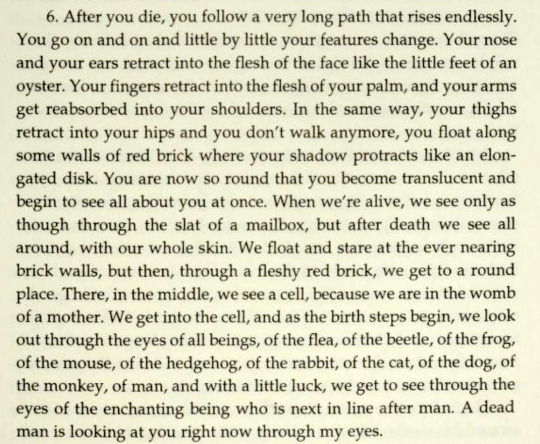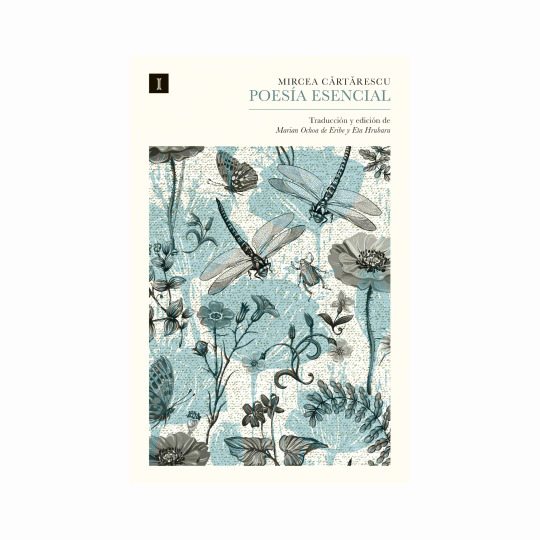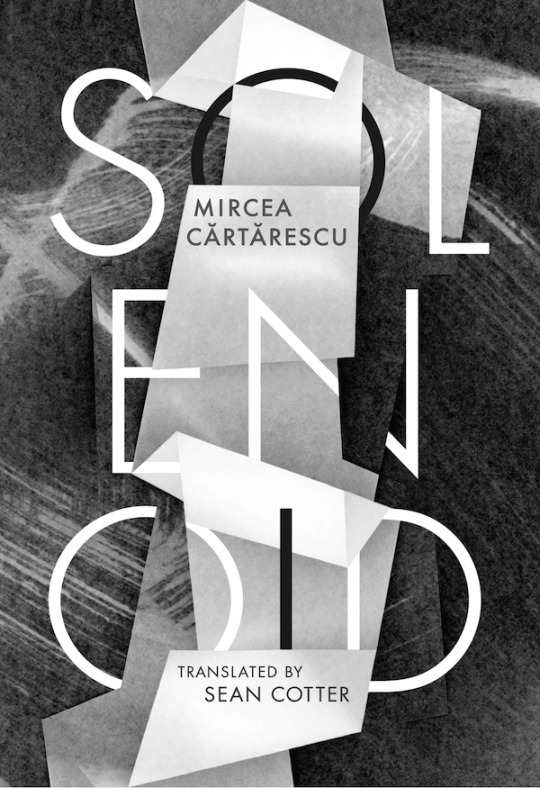#Mircea Cărtărescu.
Text
Alla mia tristezza erano caduti i dentini da latte
in cambio era cresciuta tanto che non potevo tenerla già piú nella tinozza
si spennava orribilmente e tutta la casa si riempiva delle sue piume iridate
le aspiravo profondamente e tossivo, vere crisi d'asma.
In breve aveva messo su mascelle da coccodrillo e le erano spuntate zanne da tigre
e mi seguiva dappertutto lasciando filamenti di bava sui tappeti
dormiva nel mio letto, sul mio torace, e faceva tremare tutto l'edificio quando lei russava.
Tale tristezza mi straziava la pelle della schiena, aveva ficcato un artiglio dentro di me
e mi manipolava come fossi una marionetta ringhiando.
25 notes
·
View notes
Text
toate celelalte amintiri din care-i țesută oroarea vieții mele
— Mircea Cărtărescu, Solenoid
all the other memories from which the horror of my life is woven
— trans. by Sean Cotter
13 notes
·
View notes
Text
Suddenly he was in my cabin, naked, with butterfly wings between his shoulder blades, his penis erect, powerful and golden, his dog tags on a silver chain around his neck. I clung to him and everything became luminous, fabulously colored, as though we had entered the mystical aura of a chakra with dozens of petals. When he broke my seal, he inserted in the center of my abdomen not only an ivory liquid, but also complete knowledge, as though his cannula of supple flesh had become a cord of communication between our two minds, through which, in a flash, we said everything to each other, we knew everything about each other, from the chemistry of our metabolisms to our complexes, preferences, experiences, and fantasies.
(...)
We both rose and fell, and neither of us had memories or a life of our own. We had come into the world (but which one?) only for the moment of our coupling, like two insects, in a halo of concentric circles of light. And that was how we would always be: standing, stuck together, united above in our gazes and below by that seminal cable, through which I felt millions of bits of information invading me.
Mircea Cărtărescu
Blinding (1996)
#mircea cartarescu#books#mircea cărtărescu#blinding#book quotes#lit#literature#books & libraries#books and literature#quotes#couple#romantic#lovers#fantasy#insects#butterflies#butterfly#wings#surrealist#fiction#surrealism
65 notes
·
View notes
Text





mentardy's theories from Mircea Cărtărescu's Nostalgia
#fav#I will never understand why this book isn't more popular#It changed me deeply#fav ever#Mircea Cărtărescu
5 notes
·
View notes
Text
CUANDO NIEVA, CUANDO NIEVA Y NIEVA…
Un poema de Mircea Cărtărescu, de Poesía Esencial (Impedimenta, 2021)

Mañanas felices junto al hornillo, contemplando cómo las flores de hielo
se funden lentamente… mañanas felices
cuando la nieve cuaja, cuaja, cuaja
entre los bloques. Señor,
¿por qué me das mañanas felices? Mañanas felices
abriendo la ventana, tragando el frío
y contemplando cómo la nieve cae entre los bloques. Podría ser
Canadá, Siberia…
Nadie me atosiga.
Mi máquina de escribir zurea.
Me he abrigado bien.
He tomado el café.
He escrito mis libros.
He vivido mi vida.
He encendido el hornillo con el mechero azul, de plástico transparente.
He soñado algo, pero no recuerdo qué.
Qué raro, los copos vuelan hacia arriba, hay tanta soledad,
cuánta soledad feliz me has dado, Dios mío,
cuánta soledad, como en ningún otro otoño
por dorado que fuera,
como en ningún verano… mírame, un egomaníaco
un hombre solo escribiendo en su cocina y que no quiere
salir a una Colentina nevada.
Cómo debe nevar ahí fuera… y los raíles del tranvía
cubiertos de nieve, y la nieve aventada de nuevo
de su hierro brillante… Y entre la bruma de copos
el tranvía viene… es lo único que se mueve
bajo las ráfagas, en Colentina.
Pero aquí estoy solo.
No lavo. No plancho. No hago las compras.
No me sueno la nariz.
Soy un hombre solo, sano, descansado,
acultural, apolítico.
Mi cabello está muy muy largo.
Pero mi poesía está calva como Sinead O’Connor
Y a mí me da igual.
Mañanas de duro invierno, de febrero cubierto de nieve
de un invierno duro y dichoso, lleno de luz blanca.
Mañanas, tardes, noches —en las que nieva y nieva y nieva
y nieva— y el viento brama
por el sistema de ventilación del bloque, y algo
golpea en el hueco del ascensor.
Me afanaba en otra época por escribir mis versos repletos de imágenes
por darles coherencia, por ordenarlos, por buscar la simetría
explotaban antaño mis labios, mis mejillas y dientes
de tanta droga, de tanta alucinación.
Y aquí estoy ahora: estéril, feliz
egomaníaco, devorando la nieve con los ojos. ¡Ay, Señor,
regálame este febrero, regálamelo tú!
Haz esto, haz lo otro… se acabó.
Piensa, siente, imagina… no tengo ganas.
Enzárzate con Dios… ¡Ja!
¡Ja! Todo me da igual.
No viviré eternamente.
No resolveré yo el misterio.
Me quedo aquí, calentito, viendo cómo nieva.
He aquí mi definición: estoy aquí, junto al hornillo
con la felicidad en el alma, contemplando la nieve —la que se ve
por el cristal ondulado— un individuo melenudo
que solo quiere una cosa: estar aquí
junto al hornillo, con la felicidad en el alma, contemplando la nieve.
Los copos vuelan hacia arriba, luego titubean en el aire blanco
caen oblicuos, en la profundidad de los bloques
y vuelven a subir… ¡qué curioso! ¡qué extraño!
Sí, qué curioso, Señor: estoy solo y vivo mañanas felices.
(Ayer: saqué fotos desde el balcón con mi Polaroid: primero a Kitty
sonriendo sobre el fondo de la nevada y del bloque mugriento de enfrente
después a Miri, sonriendo sobre el fondo de la nieve
y del bloque mugriento de enfrente. Y miramos fijamente los cuadrados blancos escupidos por la cámara hasta que las imágenes empezaron a salir, y luego
las pusimos en la librería, junto a mi cadenita de oro
y de esta forma dimos con El Levante
y lo leímos un rato, y luego ella dice (ya no sé qué decía),
y yo digo (¿qué le diría?), y fuera la nieve caía y caía, y la colada tiesa en la cuerda
llena de pelusa de nieve…
Anteayer: escribí un poema idiota, pero en él
había algo bueno: en el lejano norte
en Rusia, se combaban bajo el hielo los ríos Yeniséi y Lena
por los bosques vagaban presos prófugos
en una isba un joven melenudo
comía blinis, y el cierzo azotaba los postigos, era por la mañana
pero el joven tenía una vela, y el viento que silbaba entre las grietas de la isba
agitaba la llama de la vela, mientras el joven escribía con una pluma de oca:
«Oh, Nastia,
querida Nastia, si tú supieras…» Y la leña crepitaba en la estufa
y el rostro encendido del joven…
Requeteanteayer: estuve en la reunión del consejo
y durante la reunión, mientras se trataba
la situación de las revistas, yo soñaba
con escribir otra vez un libro esencial, estar otra vez con la máquina de escribir en brazos, con mi Erika
que me insulten de nuevo los viejos y los críos, y que las lectoras anónimas
modestas profesoras, doctores, pensionistas, alumnos de instituto
me lean debajo del edredón, bostezando al calor del hornillo,
levantando un instante los ojos de la página luminosa
para contemplar por la ventana la luz intensa de la nieve…
Qué decepcionados estarán con este libro,
este libro sin fotos
este libro…)
Pero a mí me da igual.
Nadie me atosiga.
El apartamento es mío.
El silencio es mío. Mi vida es mía.
Abro la ventana y cojo un puñado
de nieve blanca, esponjosa.
Abajo los coches aparcados están nevados,
los contenedores de basura nevados,
la barra de sacudir nevada.
¿Por qué me concedes mañanas felices? ¿Por qué las merezco?
Estoy arropado y tengo calor en este febrero cubierto de nieve… y estoy solo,
solo en todo Bucarest, quizá a excepción de los que
se hielan en las paradas… o solo…
y la nieve cae
y en el hornillo arde una llamita, y soy libre
y febrero, febrero, febrero
febrero, febrero… mañanas felices, Señor, cuando yo,
un egomaníaco, escribo a máquina
y me siento tan, tan…
BONUS (para el lector que ha recorrido este poema hasta el final): cuando nieva, cuando nieva
nieva, nieva, nieva, nieva
y nieva, nieva, nieva,
nieva, nieva, nieva, cuando nieva,
nieva y nieva, y nieva y
nieva y nieva, nieva, nieva, nieva y
nieva, cuando nieva, nieva,
nieva, nieva y nieva y
nieva y
nieva y
nieva y
2 notes
·
View notes
Text

Solenoid
4 notes
·
View notes
Text
Hold fast to the diary from today on! Write regularly! Don't give up! Even if no salvation comes, I want to be worthy of it at every moment.
franz kafka, in a diary entry from 1912. translated by ross benjamin
#litblr#quotes#started reading this because it’s referenced extensively by mircea cărtărescu and lydia davis#quotes on writing#and i’m such huge fans of both
18 notes
·
View notes
Text
"I have often thought I should go back to that neighborhood, where I spent my childhood among the sweetness of roses taller than me, reading on the windowsill with my legs hanging out. I thought I could go see the street with the musician’s name, the grocery, the militia station, and the clinic, not realizing you can’t revisit the imaginary neighborhood dug into the soft stone of your mind, but only the one made of brick, debris, and plaster, the one with the chestnuts that indifferently bear their spiny fruits in autumn. The neighborhoods of childhood exist nowhere on Earth. And still, I said to myself more than once: I should go there anyway. I should use the present-day buildings, clouds, and trees to project shadows onto my unshielded, sensitive brain, and perhaps in the play of their shadows I will recognize something from that time."
Solenoid, Mircea Cărtărescu
16 notes
·
View notes
Text

Currently Reading
SOLENOID
Mircea Cărtărescu
Translated from the Romanian by Sean Cotter
5 notes
·
View notes
Text
“Caută-mă!", auzeai chemarea ei tânjitoare, „caută-mă chiar şi-n trădare, chiar și-n păcat! Caută-mă chiar și-n deplină uitare! Toceşte nouăzeci și nouă de opinci de fier şi-un toiag de fier până ce vei ajunge la inima mea...".
— Mircea Cărtărescu, Theodoros
5 notes
·
View notes
Text


2 notes
·
View notes
Text
La mia illusione era cresciuta tantissimo e continuavo a non decidermi - per certi versi non mi decido nemmeno oggi - a sbottonarmi la camicia, di tanto in tanto almeno, per lasciare che mi cannibalizzasse voluttuosamente.
9 notes
·
View notes
Text
[...] nu-ncetasem să mă-ntreb cum ar fi fost oare să mă fi născut un sarcopt al râiei sau un păduche, sau unul dintre miliardele de polipi ce produc insulele de corali. Aș fi trăit fără să știu că trăiesc, viața ar fi fost o clipă de agitație obscură, cu dureri și plăceri și atingeri și alarme, și îndemnuri, departe de gândire și de conștiință, într-o gaură abjectă, într-o pată oarbă, într-o uitare totală. "Dar asta și sunt, asta și sunt,“ m-am pomenit deodată spunând cu voce tare. Asta suntem cu toții, acarieni orbi fojgăind pe firul nostru de praf în infinitatea neștiută, irațională, în fundătura oribilă a acestei lumi. Gândim, avem acces la structura logico-matematică a lumii, dar continuăm să trăim fără conștiință de sine și fără-nțelegere, săpând tunele-n pielea lui Dumnezeu, provocându-i doar iritare și mânie.
— Mircea Cărtărescu, Solenoid, Ed. Humanitas
I hadn’t stopped wondering what it would have been like to be born as a mite or a louse, or one of the billions of polyps on coral reefs. I would have lived without knowing that I lived, my life would have been a moment of obscure agitation, with pains and pleasures and contacts and alarms and urges, far from thought and far from consciousness, in some abject hole, in a blind dot, in total oblivion. But that is what I am, it is,” I suddenly found myself saying out loud. This is what we all are, blind mites stumbling along our piece of dust in an unknown, irrational infinity, in the horrible dead end of this world. We think we have access to the logical-mathematical structure of the world, but we continue to live without self-consciousness and without understanding, digging tunnels through the skin of God, causing him nothing but fits and irritation.
— trans. by Sean Cotter, Ed. Deep Vellum Publishing
9 notes
·
View notes
Photo


[improvised translation:
photo 1: i am unwell / i was deeply hurt / then i hurt myself / even worse / i was waiting for something from you / and you hurt me / even deeper
photo 2: self and being / is the same thing // and // the same thing / as pain]
-- Mircea Cărtărescu, Nu striga niciodată ajutor (Never cry for help)
8 notes
·
View notes
Text
It's my birthday today, which always feels like a time to take account. The last month or two, I've endeavored to channel spates of low mood into the reasonably productive activity of reading, rather than mere vegetation, and I've had good success. I just finished Mircea Cărtărescu's Solenoid—a long novel about a lonely weirdo in communist Romania reckoning with existential dread. Also finished Susan Taubes's Lament for Julia, a novella paired with various short stories, all with a powerful Freudian bent, Taubes being the daughter of a psychoanalyst and prone to autobiographically inflected fiction. Fathers and daughters are locked in strange relation; men and women antagonize each other; there's much angst around the emergence and forcible repression of sexuality and desire. I also completed a reread of Crime and Punishment (impressive in its structure, if not at the line level; conservative, like much of Dostoevsky, in its premises and sympathies, though not without its points when it comes to the weaknesses that certain modes of thought can have when they're adopted carelessly, as vogues, and in arguing for the necessity of humility against despair when one's despair stems, as Raskolnikov's does, from overweening self-regard). And I read Rilke's Letters to a Young Poet—which was a funny one. Much to love in it, certainly. I also felt a bit of a twang reading, say, Rilke's condemnation of "the unreal half-artistic professions"—among which he includes "almost all of criticism"—"which, while they pretend proximity to some art, in practice belie and assail the existence of all art." Oh look, it's the form to which I've apparently pledged my troth, ha ha whoops.
I admit I wasn't blown away by Solenoid as I thought I might be. It offers a slightly banal resolution to existential crisis... That is, that the narrator ultimately meets the horror he spends about six-hundred pages grappling with—of the possibility that he might be trapped within three dimensions when a fourth, superior dimension might exist, meaning (I know this sentence is Going Places, stay with me) a dimension that is not ruled by the determinism by which any dimension is ruled in the eyes of those who can see it from the next dimension on, the same way that the life of, say, a mite might seem determined to us, all unthinking instinct and bound to a terribly specific and minute purpose, given our position as the mite's vast superior—that he counters the tremendous weight of this fear by turning to an abstract love for humanity and the purpose he finds in raising the child he has with his lover, Irina... It reminded me of the commitment to bourgeois normalcy that the protagonist of Antal Szerb's Journey by Moonlight makes, and how that let me down after his Master-and-Margarita-esque path through other, more hallucinatory forms of experience in the first three-quarters of that novel—which promised, I don't know, something more.
But I can understand the turn. And Solenoid does have some terrific setpieces along the way. One is the protest of the "Picketists"—a sect the narrator stumbles upon that stages demonstrations against life's pain and suffering (their signs bear lines like "Down with Death!" "Down with Rotting!" "Down with Accidents!" "NO to Agony!" and "Stop the Massacre!")—before a building in Bucharest that once housed one of the first institutes of forensic medicine, whose cupola bears thirteen statues depicting the soul's dark sides, Sadness, Despair, Fear, Bitterness, Melancholy, Revulsion, Nausea, Mania, Horror, Grief, Nostalgia, Resignation, and Damnation. Most striking is the way that protest ends, with the statue of Damnation—which has come alive, "as alive and slow-moving as soft glass and black as anthracite"—stamping on the lead protestor, Virgil, crushing him, when he asks her whether anything humanity can offer her will ever be enough.
Cărtărescu is also quite skillful at pacing his plot across the novel's 638 pages, as the narrator discovers each of the six solenoids sprinkled across Bucharest—the massive electromagnets that make possible eerie wonders like levitation and serve as engines that, essentially, power the world—and as he endures his own Virgil-like trial among the Picketists at the novel's end. Translator Sean Cotter also deserves a ton of credit, I'm sure. It can't have been easy to translate a narrative like this one, which depends so much on so many references to Bucharest's geography, Romania's history, and the histories of so many figures, so strangely intertwined—the forensic scientist Mina Minovici, who studied death (through, in Cărtărescu's telling, intense bouts of self-strangulation); the psychologist Nicolae Vaschide, who studied dreams, which in the narrator's mind join death as one of two potential means of escape from this world to the next; and the mathematician Charles Howard Hinton, who married Mary Ellen Boole, daughter of mathematician and logician George Boole, whose other daughter, Ethel, married Wilfrid Voynich, famous owner of the Voynich manuscript, which the narrator ultimately comes to possess and, at the novel's end, offers to the goddess Damnation, whereupon its pages somehow morph into a tesseract, the shape that Hinton once theorized as the fourth-dimensional analogue of the cube; the next level of complexity to it, just as the cube is the next-level of the two-dimensional square—thereby permitting the narrator one glimpse, one moment of contact with whatever it is that lies in the fourth dimension, beyond...
So, you know, it's been a time. If you're in the mood for a long novel about an intelligent, sensitive, neurotic thwarted artist confronting the fear that has oppressed his life, that engages whole histories of mathematics, logic, and philosophical thought along the way, you might give Solenoid a shot. Meanwhile, I'll end this with some words from Rilke in his last letter to the young poet, Franz Krappus, when Krappus was twenty-five: "Do you remember how [your] life yearned out of its childhood for the 'great'? I see that it is now going on beyond the great to long for greater. For this reason it will not cease to be difficult, but for this reason too it will not cease to grow." Arrange your life, he tells Krappus, according to that principle which counsels us that we must always hold to the difficult. I'm certainly not in my twenties as I write this, but the lines still inspire.
#literary#books#mircea cărtărescu#susan taubes#rainer maria rilke#charles howard hinton#voynich manuscript#george boole#franz xaver krappus#sean cotter#nicolae minovici#nicolae vaschide#fyodor dostoevsky#antal szerb
3 notes
·
View notes
Text
He dicho «motor metafísico», pero pienso ahora que podría llamarle también «motor paranoico», en la medida en que toda metafísica es, de hecho, paranoia. De repente, un buen día, ves a tres o cuatro ciegos después de no haber visto ninguno en muchos años, ni siquiera en sueños. Conoces a una mujer llamada Olimpia y al cabo de unos minutos abres un diccionario de pintura por la página de la Olympia, de Manet y, dos horas después, en la calle, descubres la Floristería Olimpia. Son nudos de significado, plexos del sistema neural del mundo que unifica sus órganos y sus acontecimientos, indicios que deberías seguir hasta las últimas consecuencias, y lo harías si no tuvieras los prejuicios estúpidos de la realidad. Deberíamos tener un sentido que discriminara entre el signo y la coincidencia. Ves un día, una detrás de otra, tres mujeres embarazadas: ¿qué quiere decir eso? Y si hubieran sido solo dos, ¿te habría sorprendido también la coincidencia? ¿Y si a las tres añadieras una más, que sale de repente de una casa y camina ante ti por la calle? ¿Y si esta se detuviera, se volviera de golpe y te tendiera una nota arrugada en la que pone tan solo «¡Socorro!», y luego corriera pesadamente calle arriba? ¿Cuánto resiste el hielo de la realidad? ¿Cuándo, en qué momento, sientes su crujido bajo los pies? Atisbas al principio las grietas finas de las coincidencias que se ramifican y se ensanchan de forma alarmante, pero el hielo todavía te sostiene y no te causa problemas por el momento: es tan solo una embarazada más, la cuarta. Puede suceder. No es imposible encontrarse con todas ellas a lo largo de un solo día. Pero la embarazada te entrega una nota, lees el mensaje y de repente el lulo se resquebraja y te hundes en el agua helada, y estás debajo, buscando como una foca un agujero a través del cual poder respirar.
Solenoide - Mircea Cărtărescu
4 notes
·
View notes